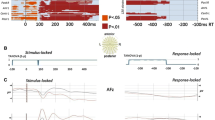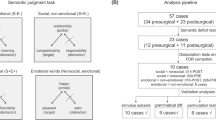Abstract
In this study, we investigated different aspects of semantic-lexicalrepresentation in patients with schizophrenia. The patients were classiffedas having prominent thought disorder (TD) characterized by loosened associationsand negative symptoms (NS) characterized by poverty of speech. The test batteryincluded uency measures (phonological, semantic, and action), picture naming/categorization,and feature retrieval. The schizophrenia patients as a group showed a generalizedword retrieval defficit, together with spared picture naming and impairedpicture categorization/feature retrieval. The patients with TD were especiallyimpaired in the semantic uency and picture categorization tests. The patientswith NS demonstrated marked dysfunctions in the action uency test and theyretrieved inappropriately fewer features in the case of man-made tools. Theseresults support the hypothesis that TD is accompanied by a disturbed semanticsystem, whereas in patients with NS the impairment of the supervisory/executivesystem is the most dominant. The lexical size is normal in mildly affectedschizophrenia patients. Our study further demonstrates that the representationof real-world knowledge is not restricted to a single cognitive module ormemory function. Instead, an integrated operation of a large-scale neuronalnetwork must be taken into consideration.
Similar content being viewed by others
References
Allen, H. E. et al. 1993. Negative features, retrieval processes, and verbal fluency in schizophrenia. In: British Journal of Psychiatry 163: 769-75.
Aloia, M. S. et al. 1996. An investigation of semantic space in patients with schizophrenia. In: Journal of International Neuropsychological Society 2: 267-73.
American Psychiatric Association. 1994. DSM-IV: Diagnostic and Statistical Manual of Mental Disorders, 4th ed. American Psychiatric Association, Washington DC.
Baddeley, A. D. 1992. Working memory. In: Science 225: 556-9.
Benton, A.-K. Hamsher. 1976. Multilingual aphasia evaluation. University of Iowa, Iowa City.
Black, D. W.-N. C. Andreasen. 1999. Schizophrenia, schizophreniform disorder, and delusional (paranoid) disorders. In: R. E. Hales et al. (eds): The APP textbook of psychiatry. 425-78. APP, Washington DC.
Buckner, R. L. et al. 1999. Frontal cortex contributes to human memory formation. In: Nature Neuroscience 2: 311-4.
Büchel, D. et al. 1998. A multimodal language region in the ventral visual pathway. In: Nature 394: 274-7.
Cappa, E. et al. 1998. Object and action naming in Alzheimer's disease and fronto-temporal dementia. In: Neurology 50: 351-5.
Caramazza, A. 2000. The organization of conceptual knowledge in the brain. In: M. Gazzaniga (ed.): The new cognitive neurosciences. 1037-46. MIT, Cambridge MA.
Caramazza, A.-A. E. Hillis. 1991. Lexical organization of nouns and verbs in the brain. In: Nature 349: 788-90.
Caramazza, A.-J. R. Shelton. 1998. Domain-specific knowledge in the brain: The animate-inanimate distinction. In: Journal of Cognitive Neuroscience 10: 1-34.
Chao, L. L.-A. Martin. 2000. Representation of manipulable man-made objects in the dorsal stream. In: Neuroimage 13: 478-84.
Chee, M. W. et al. 2000. Overlap and dissociation of semantic processing of Chinese characters, English words, and pictures: evidence form fMRI. In: Neuroimage 12: 392-403.
Chen, E. Y. H. et al. 1994. Semantic memory is both impaired and anomalous in schizophrenia. In: Psychological Medicine 24: 193-202.
Curtis, V. A. et al. 1998. Attenuated frontal activation during verbal fluency task in patients with schizophrenia. In: American Journal of Psychiatry 155: 1056-63.
Damasio, A. R. 1990. Category-related recognition defects as a clue to the neural substrates of knowledge. In: Trends in Neurosciences 13: 95-8.
Damasio, A. R.-D. Tranel. 1993. Nouns and verbs are retrieved with differentially distributed neural systems. In: Proceedings of the National Academy of Science of the USA 90: 4957-60.
Damasio, H. et al. 1996. A neural basis for lexical retrieval. In: Nature 380: 499-505.
Elliott, R.-B. J. Sahakian. 1995. The neuropsychology of schizophrenia: Relations with clinical and neurobiological dimensions. In: Psychological Medicine 25: 581-94.
Farah, M. et al. 1989. Category-specificity and modality-specificity in the semantic memory. In: Neuropsychologia 27: 193-200.
Feinstein, A. et al. 1998. Types and characteristics of remote memory impairment in schizophrenia. In: Schizophrenia Research 30: 155-63.
Frith, C. D. et al. 1995. Regional brain activity in chronic schizophrenic patients during the performance of verbal fluency task. In: British Journal of Psychiatry 167: 343-9.
Goldberg, T. E. et al. 1998. Cognitive substrates of thought disorder I: The semantic system. In: American Journal of Psychiatry 155: 1671-6.
Gourovitch, M. L. et al. 1997. Semantic and phonological fluency in schizophrenia: evidence for a differential deficit. In: Neuropsychologia 35: 573-7.
Gourovitch, M. L. et al. 2000. A comparison of rCBF patterns during letter and semantic fluency. In: Neuropsychology 14: 353-60.
Graham, K. S. et al. 2000. Insights from semantic dementia on the relationship between episodic and semantic memory. In: Neuropsychologia 38: 313-24.
Hodges, J. R. 2000. Memory in the dementias. In: Tulving-Craik (2000): 441-59.
Joyce, E. M. et al. 1996. Verbal fluency in schizophrenia: Relationship with executive functions, semantic memory and alogia. In: Psychological Medicine 26: 41-52.
Kéri, S.-Z. Janka. 2001. Kognitív és pszichofiziológiai zavarok szkizofréniában [Cognitive and psychophysiological dysfunctions in schizophrenia]. In: Magyar Pszichológiai Szemle, in press.
Kuperberg, G. R. et al. 2000. Common and distinct neural substrates for pragmatic, semantic, and syntactic processing of spoken sentences: an fMRI study. In: Journal of Cognitive Neuroscience 12: 321-41.
Laws, K. R. et al. 2000. Lexical knowledge degradation in schizophrenia. In: Schizophrenia Research 45: 123-31.
Martin, A. et al. 2000. Category specificity and the brain: The sensory/motor model of semantic representation of objects. In: M. Gazzaniga (ed.): The new cognitive neurosciences. 1037-46. MIT, Cambridge MA.
McKay, A. P. et al. 1996. Semantic memory is impaired in schizophrenia. In: Biological Psychiatry 39: 929-37.
Mummery, C. J. et al. 1996. Generating “tiger” as an animal name and a word beginning with T: Differential brain activation. In: Proceedings of the Royal Society of London Biological Sciences: 263, 989-95.
Nyberg, L.-E. Tulving. 1996. Classifying human long-term memory: Evidence from converging dissociations. In: European Journal of Cognitive Psychology 8: 163-83.
Overall, J. E.-D. R. Gorham. 1962. Brief Psychiatric Rating Scale. In: Psychological Reports 10: 799-812.
Paulsen, J. S. et al. 1996. Impairment of the semantic network in schizophrenia. In: Psychiatry Research 63: 109-21.
Piatt, A. L. et al. 1999a. Action (verb naming) fluency as an executive function measure: Convergent and divergent evidence and validity. In: Neuropsychologia 37: 1499-503.
Piatt, A. L. et al. 1999b. Lexical, semantic, and action verbal fluency in Parkinson's disease with and without dementia. In: Journal of Clinical and Experimental Neuropsychology 21: 435-43.
Randolph, C. et al. 1993. Semantic fluency in Alzheimer's, Parkinson's and Huntington's disease: Dissociation of storage and retrieval failures. In: Neuropsychology 7: 82-8.
Schacter, D. L. et al. 2000. Memory systems of 1999. In: Tulving-Craik (2000): 627-43.
Shallice, T. et al. 1991. Can the neuropsychological case-study approach be applied in schizophrenia? In: Psychological Medicine 21: 661-73.
Smith, E. E.-J. Jonides. 1999. Storage and executive processes in the frontal lobes. In: Science 283: 1657-61.
Spitzer, M. 1997. A cognitive neuroscience view of schizophrenic thought disorder. In: Schizophrenia Bulletin 23: 29-50.
Spitzer, M. et al. 1995. Category-specific brain activation in fMRI during picture naming. In: Neuroreport 6: 2109-12.
Squire, L. R.-S. M. Zola. 1998. Episodic memory, semantic memory, and amnesia. In: Hippocampus 8: 205-11.
Tranel, D. et al. 1997. A neural basis for the retrieval of conceptual knowledge. In: Neuropsychologia 35: 1319-27.
Tulving, E.-F. I. M. Craik (eds). 2000. The Oxford handbook of memory. Oxford University Press, Oxford.
Vandenberghe, R. et al. 1996. Functional anatomy of a common semantic system for words and pictures. In: Nature 383: 254-6.
Van Essen, D. C. et al. 1992. Information processing in the primate visual system: An integrated systems perspective. In: Science 225: 419-23.
Warrington, E. K.-R. McCarthy. 1983. Category specific access dysphasia. In: Brain 106: 859-78.
Williamson, D. et al. 1998. Object and action naming in Alzheimer's disease. In: Cortex 34: 601-10.
Zingeser, L. B.-R. S. Berndt. 1990. Retrieval of nouns and verbs in agrammatism and anomia. In: Brain and Language 39: 14-32.
Author information
Authors and Affiliations
Rights and permissions
About this article
Cite this article
Kéri, S., Szendi, I., Benedek, G. et al. Clinical evidence of separate neuronal systems for phonemic, semantic and action information. Acta Linguistica Hungarica 48, 271–290 (2001). https://doi.org/10.1023/A:1015655708050
Issue Date:
DOI: https://doi.org/10.1023/A:1015655708050




